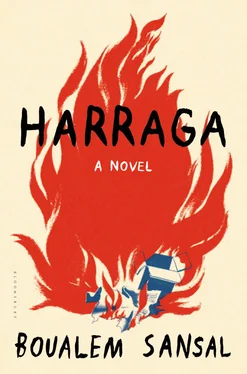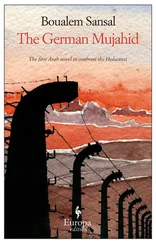She came back at midnight, on the twelfth stroke. Or thereabouts. This was the time limit I had set before hanging myself. I was guilty. Past midnight, only corpses and their killers roam the streets of this city. I had allowed her to go out, alone, after dark, in a neighbourhood where even murderers are scared of their own shadows. I rushed to open the door, expecting to meet with a violent death. Whew! It was her, with her holdall and her regal airs. She went straight into the living room — her bedroom — without so much as looking at me. I fought the urge to bump her off myself, right there in the hall. Next time, I’ll kill her and I won’t lose any sleep. A woman has a right to a little respect in her own home. As I closed the door, I thought I saw among the shifting shadows of the poplar trees that guard the neighbourhood, the figure of a man disappearing into the darkness.
One more worry. And a major one.
Day, night,
Within, without,
The rough beast
Waits
With dagger drawn.
Against all faith
Against all laws
The rough beast
Strikes
With burning hook.
Beware, woman
Beware, child,
The rough beast
Runs
With tail erect.
Cowering
Contented
Man awaits
His beloved beast
HIS FEAR.
I’m not sure whether I miss my former solitude, those long, leisurely evenings, the weekends spent like a worker bee on strike, the wanton wildness and the associated absences, the curious habits of a confirmed spinster which, though unrewarding, are familiar, the delicious thrill of fear in the darkness and my heroic rebellions against the ghosts who share with me the mysteries of the past and the murmuring of walls steeped in forgotten stories. No, I have no regrets, only fond memories. I enjoyed my rootless solitude, enjoyed shutting myself away in this house which, for more than two centuries, has seen so many people come and go, taking on the wrinkles, the wilful habits and the curious odours of those who came before us, the janissaries, the hookah smokers, by their own intrigues or by some insidious illness; a high-ranking Turk — an officer in the Sultan’s guard — built this house as a weekend retreat; after him came a viscount, a blue-blooded Frenchman, part soldier, part naturalist, who, in time, put down roots in the medina , embracing Islam and one of its daughters; next came a Jew whose ancestors it seems arrived on the Barbary Coast before the upheavals began; he was followed by a succession of pieds-noirs who arrived in wretched hordes from Navarre and Galilee and are now exiled to the north pole; then, shortly after independence, it was my parents’ turn. They came down from the mountains of Greater Kabylia, and for a while they housed friends and allies and, during the ‘Years of Lead’ that followed when honour was at a low ebb, they took in furtive strangers who showed up with their secrets and left before we could discover what they were. How we tried to eavesdrop on those whispered conversations! But this house is big, we were small, inexperienced, and much went over our heads.
I enjoyed my forays into impenetrable silences, and all the questions that come to mind when time moves on without us; I would embellish them according to my whims, my moods. I would drift far away, reluctant to return. Reality is but a port of call on our journey, a succession of mindless chores, repetitive gestures, tedious stories, so we might as well be brief. And yet I enjoyed tackling domestic problems as antiquated as the house itself with cold determination and an almost perverse punctiliousness. In a way a simple life is very complicated. There are the unknowns and all the shifting imponderables in the background. The walls are crumbling, the pots are chipped, the iron cuts out during ironing, the pipes are leaking, everything creaks or groans and sometimes the house is plunged into darkness in broad daylight. Increasingly, it seems to me, whole sections are falling apart. Why, I don’t know; sometimes these cave-ins took place inside my head. I was surrounded by antiquated things which gave up the ghost faster than I could fix them. You deal with it or you don’t. Even the screws can come unscrewed, I thought, at the end of the day as I reached for a hammer. For a while, it was like a religion to me, a form of post-industrial asceticism made up of transcendental shrugs and sighs and bouts of blind rage, a type of OCD complete with the liberating rituals that entails. But at least it gave my arms some muscle tone and distracted my ears from the revolutionary claptrap fed like milk and honey to the masses. This was the era of diatribes and mass protests, of gobbledygook spouted all the working week and silent only on the Sabbath. There’s not a single gadget in this house I didn’t manage to dismantle only to have to replace it with a new, more complicated model which immediately sneered at me from its state-of-the-art technology. Not a single object was made within these walls, they all show up without warning, cash on delivery, and are promptly put in the right place, there to age safe from prying eyes. The real feat is not getting them to work — something that can be done with the press of a button — but in deciphering the instructions. It’s astonishing the sheaves of booklets that spew from the cardboard boxes, you can picture yourself dying, stupid and useless. Finding your own language in an instruction booklet is a riddle in itself, so I would read the first page that came to hand, Chinese, Korean, Hindu, Russian, Turkish, Greek. I would stare and stare at the text. It’s so complicated. It seems impossible that people can speak and understand these languages. I avoided the French booklets, churned out by polyglots who learn the language of Molière from fast-food menus. They infuriated me, I felt an irresistible urge to rewrite them before reading them point by point. I ignored the Arabic, which reminds me of the hateful slew of paperwork that our glorious government uses to manipulate us from January to December all the civic year. I shunned the manuals in English because, though I can muddle through, it gives me the creeps, it makes me feel ignorant and anxious. English is the language of those who travel, and I don’t travel. Who but me would confess to turning on machines without reading the instructions? The phase was short-lived, I didn’t have many gadgets, and since everything comes with time, it was something I was determined to work out for myself: technology is serious business, it’s man’s work, something women have no right to meddle with. I quickly worked out how best to proceed. Tonton Hocine, a friend of Papa’s who lives on the Impasse des Alouettes, a veteran of some war or other — independence probably — would come round with his box of tricks whenever I asked and, with the air of an indignant expert, make it clear what a terrible mess I had made of things. I had the poor man wrapped round my little finger. Once you got him going, he was a powerhouse, he would immediately set about finding the leak. I found it fascinating to watch him sweat blood, blowtorch in hand, trying heroically to fix the pipe. Aside from the tiny garden, now parched as the savannah, the house was suffering from nothing more serious than mild arthritis, something an old man could do nothing about. The wind whistling through cracks in the windows and the doorframes grated on my nerves, but there was no through breeze. To thank him, I found nothing better than to stroke his hair over a cup of strong coffee. Having often seen his breath flame in his unkempt thatch of beard, I knew that Tonton Hocine was fuelled by rotgut, but how could a woman buy wine and how could I offer him alcohol without shocking him and losing his respect? Besides, I had my scruples, his limbs were plagued with gout, and it was bad enough that he was using what little strength he had to help me out. So I stuck with serving coffee thick as tar, which I pressed until it yielded rubbing alcohol. I listened to him, blissful to the point of brainlessness, chin resting on his hand, as he refought his battles with pen-pushers, relived old quarrels with a certain Corporal Abou Hitler and, towards the end, when the important things remain to be said, he would rail about Arabs whom he claimed power made particularly cruel. Old men have their pet subjects, there’s nothing you can do to shut them up. Hocine was a sweet little man. He was a Kabyle and still very much a hill tribesman, a rough diamond with a bushy moustache that tickled his ears, a paunch that pulled him forward and down, rheumy eyes and a tuft of lank hair that fell over his warty nose making him look like an ageing walrus capable of hibernating for six months at a stretch. He talked the only way he knew how, in the Tamazight dialect of the distant, precipitous Djurdjura Mountains, so, for him, words probably exceeded the sheer, sad reality. These crafty old devils have a tendency to make categorical pronouncements, there’s never any debate. I thought no differently to him, but I wasn’t old enough to share my thoughts without consequences so I simply nodded meekly. All this was fascinating, but it was terribly expensive since the man could spend whole afternoons talking and tinkering and, being retired, I found it difficult to pay his hourly rate. Then one day, he dropped dead and I cried like a child.
Читать дальше












